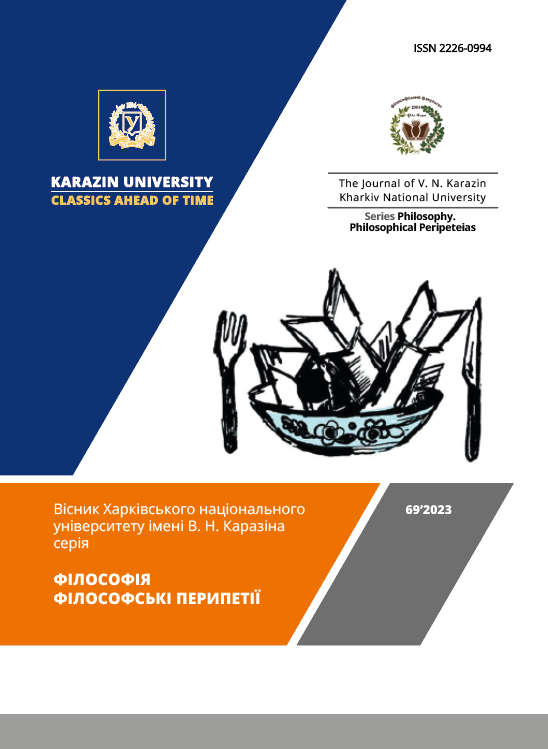МЕМІРОНІЯ: ВІДБИТТЯ СТОСУНКІВ В МЕМАХ
Анотація
В дослідженні вивчається взаємний вплив мемів і любовних чи сексуальних стосунків. Воно показує те, що, з одного боку, тема стосунків є однією з найпоширеніших і багато в чому визначає інтернет меметику в цілому. З іншого боку, створення та надсилання мемів стало важливою частиною сучасних стосунків і підтримує їх. Меми допомагають пам’ятати ключові моменти успішних стосунків, і це знання є складовою їх фону, та дозволяють розвивати їх і, в той же час, зміцнюють їхню стійкість через добрий емоційний контекст. З огляду на це, дослідження показує, що меметичний гумор, навіть у його найгостріших або чорніших формах, відіграє позитивну роль. На підґрунті цього в дослідженні вводяться та розглядаються нові концепти меміронії та метагумору. Так, дослідження підтверджує, що меми є частиною пост-постмодерної подієвості, більш життєвої та щирої, ніж постмодерністська. Життєві, правдиві меми, у порівнянні з надто інтелектуальними мемами, допомагають підтримувати тісніші стосунки через дійсну любовну гру. Особливу увагу в дослідженні приділено лінгвістичній складовій мемів, зокрема «мовам» мемів. Окрім базових меметичних концепцій Лімора Шифмана, Дугласа Хофстадтера, Сьюзен Блекмор та ін., а також когнітивного підходу Деніела Деннета, дослідження ґрунтується на концепції кохання як комедії Аленки Зупанчіч та сміху як мовного прояву Младена Долара, концепції співвідношення щирості, комізму та шарму Грема Гармана та ін. Дослідження проводилось на матеріалі інтернет-мемів, а також інших творів сучасного мистецтва, які демонструють важливість гумору для стосунків.
Завантаження
Посилання
Blackmore, S. (1999). The Meme Machine. Oxford: Oxford University Press.
Božovič, M. (2002). Diderot’s Hysterical Materialism. Kulturwissenschaftliches Institut im Wissenschaftszentrum NRW, Jahrbuch 2001/2002, 171–186.
Bryant, L. R. (2011). The Democracy of Objects. Open Humanities Press. Ann Arbor: University of Michigan Library.
Christina, G. (2017). Are We Having Sex Now or What? In R. Halwani, A. Soble, S. Hoffman & J. M. Held (Eds.). The Philosophy of Sex Contemporary Readings, (pp. 31–37). Lanham, Boulder, N.-Y. & L.: Rowman & Littlefield.
Derrida, J. (2008). The Animal That Therefore I Am. N.-Y.: Fordham University Press.
Dolar, M. (2006). A Voice and Nothing More. Massachusetts & L.: The MIT Press.
Gans, E. (1995). Toujours l’amour. Chronicles of Love and Resentment, 20. Retrieved from http://anthropoetics.ucla.edu/views/vw20/
Harman, G. (2005). Guerilla Metaphysics: Phenomenology and the
Carpentry of Things. Chicago and La Salle, Illinois: Open Court.
Hofstadter, D. (1985). Metamagical Themas: Questing for the Essence of Mind and Pattern. N.-Y.: Basic Books.
Jeske, D. (2019). Love and Friendship. In A. M. Martin (Ed.). The Routledge Handbook of Love in Philosophy, (pp. 13–22). N.-Y. & L.: Routledge.
de Jong, C. (2017). Modern Love. N.-Y.: Primary Information/Ugly Duckling Presse.
July, M. (2015). The First Bad Man. N.-Y., L., Toronto, Sydney, New Delhi: Scribner.
Kien, G. (2019). Communicating with Memes: Consequences in Post-truth. Civilization. Lanham, Boulder, N.-Y. & L.: Lexington Books.
Konstantinou, L. (2017). Four Faces of Postirony. In R. Van den Akker, Α. Gibbons, T. Vermeulen (Eds.). Metamodernism: Historicity, Affect, and Depth after Postmodernism, (pp. 87–102). Lanham: Rowman & Littlefield.
Kraus, Ch. (2006). I Love Dick. L.-A.: Semiotext(e) / Native Agents.
Leader, D. (2002). Extract from Why Do Women Write More Letters Than They Post? In S. Žižec (Ed.). Jacques Lacan: Critical Evaluations in Cultural Theory. Vol. I: Psychoanalytic Theory and Practice, (pp. 97–116). N.-Y., L.: Routledge.
McNeill, L. S. (2009). The End of the Internet: A Folk Response to the Provision of Infinite Choice. In T. J. Blank (Ed.). Folklore and the Internet: Vernacular Expression in a Digital World, (pp. 80–97). Logan: Utah State University Press. DOI: https://doi.org/10.2307/j.ctt4cgrx5.7
Němec, J. (2019). Možnosti milostného románu [Possibilities of Love Novel]. Brno: Host.
Saunders, J. (2022). Loves Passed. In A. Grahle, N. McKeever & J. Saunders (Eds.). Philosophy of Love in the Past, Present, and Future, (pp. 131–144). N.-Y. and L. Routledge, 2022. DOI: 10.4324/9781003014331-12
Saunders, J. (2018). Taking Love Seriously: McTaggart, Absolute Reality and Chemistry. British Journal for the History of Philosophy, 26 (4), 719–737. Retrieved from https://dro.dur.ac.uk/26993/1/26993.pdf. DOI: https://doi.org/10.1080/09608788.2017.1393617
Shifman, L. (2014). Memes in digital culture. Cambridge, MA. & L.: The MIT Press.
Soble, A. (2017). Sexual Use. In R. Halwani, A. Soble, S. Hoffman & J. M. Held (Eds.). The Philosophy of Sex Contemporary Readings, (pp. 293–320). Lanham, Boulder, N.-Y. & L.: Rowman & Littlefield.
Zupančič, A. (2004). Investigations of the Lacanian Field: Some Remarks on Comedy and Love. Polygraph: An International Journal of Culture & Politics, 15/16, 131–146.
Zupančič, A. (2003). On Love as Comedy. Journal for Politics, Gender and Culture. Vol. II, 1, Summer, 61–80.
Zupančič, A. (2020). Preston Sturges and The End of Laughter. Crisis and Critique, Vol. 7, Issue 2, 272–289.
Zupančič, A. (2017). What is sex? Cambridge, MA. & L.: The MIT Press.
Vine, L. (2017). Hot Mess. L.: Orion.
Wiggins, B. E. (2019). The Discursive Power of Memes in Digital Culture: Ideology, Semiotics, and Intertextuality. N.-Y. & L.: Routledge.
Авторське право (c) 2023 Наталія Загурська

Цю роботу ліцензовано за Міжнародня ліцензія Creative Commons Attribution 4.0.
Автори, які публікуються у цьому журналі, погоджуються з наступними умовами:
- Автори залишають за собою право на авторство своєї роботи та передають журналу право першої публікації цієї роботи на умовах ліцензії Creative Commons Attribution License 4.0 International (CC BY 4.0), котра дозволяє іншим особам вільно розповсюджувати опубліковану роботу з обов'язковим посиланням на авторів оригінальної роботи та першу публікацію роботи у цьому журналі.
- Автори мають право укладати самостійні додаткові угоди щодо неексклюзивного розповсюдження роботи у тому вигляді, в якому вона була опублікована цим журналом (наприклад, розміщувати роботу в електронному сховищі установи або публікувати у складі монографії), за умови збереження посилання на першу публікацію роботи у цьому журналі.
- Політика журналу дозволяє і заохочує розміщення авторами в мережі Інтернет (наприклад, у сховищах установ або на особистих веб-сайтах) рукопису роботи, як до подання цього рукопису до редакції, так і під час його редакційного опрацювання, оскільки це сприяє виникненню продуктивної наукової дискусії та позитивно позначається на оперативності та динаміці цитування опублікованої роботи (див. The Effect of Open Access).






3.gif)




